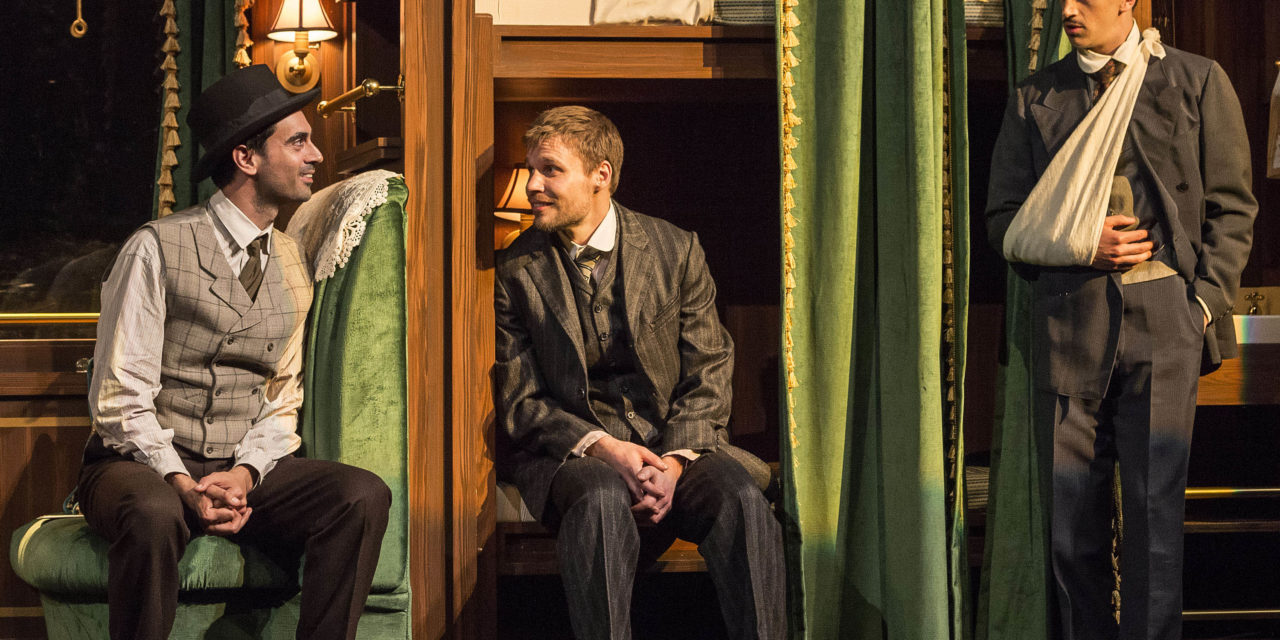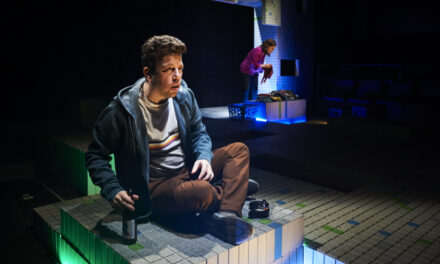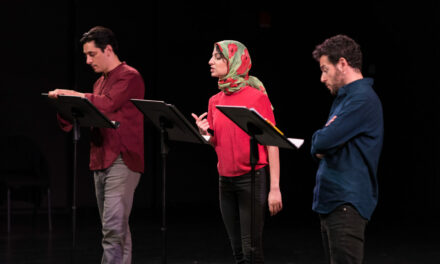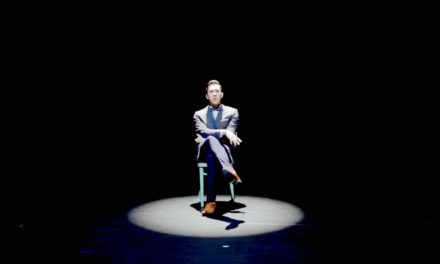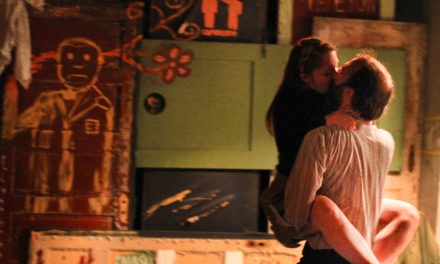The first image we were greeted with as audience members arriving to experience Rajiv Joseph’s Archduke at the Mark Taper Forum in Los Angeles was a bare wooden stage in front of a proscenium that was closed off to us via imposing floor to ceiling doors. When the doors opened, they revealed a doctor’s office complete with a hanging skeleton that appeared on a platform, which rolled, jerkily, into position. Downstage stood Gavrilo [Stephen Stocking] – the central character in this semi-ensemble-driven piece. He coughed, his breathing hindered by the blood in his lungs visible on a white handkerchief he stared at with a mix of curiosity and horror. Five minutes later Gavrilo stood in a different kind of horror confronting the skeleton was made of ‘lady bones.’ Reaching out to touch them, Gavrilo accidentally dismantles the skeleton leaving nothing but the rib cage, spine and skull.
It was in that moment I recalled an interview with Rajiv and director Giovanna Sardelli on NPR wherein they discussed the comedic take they were bringing to history. The American Revolutionary War may lay claim to the ‘shot heard round the world’ but one could easily say the seemingly inevitable assassination of Archduke Ferdinand and his wife Sophie was the shot felt around the world in ways the play’s naïve antihero couldn’t have imagined. Tonally, the attempt to highlight comedic aspects of the plot [Nedeljko bombed the wrong car, broke his leg trying to jump into the river and was arrested. Trifko was with a prostitute. Gavrilo went for a sandwich on the street where the Archduke’s car stalled] never lands, save for the moments when the plot’s mastermind Dragutin “Apis” Dimitrijevic [played by powerhouse Patrick Page] takes the stage.
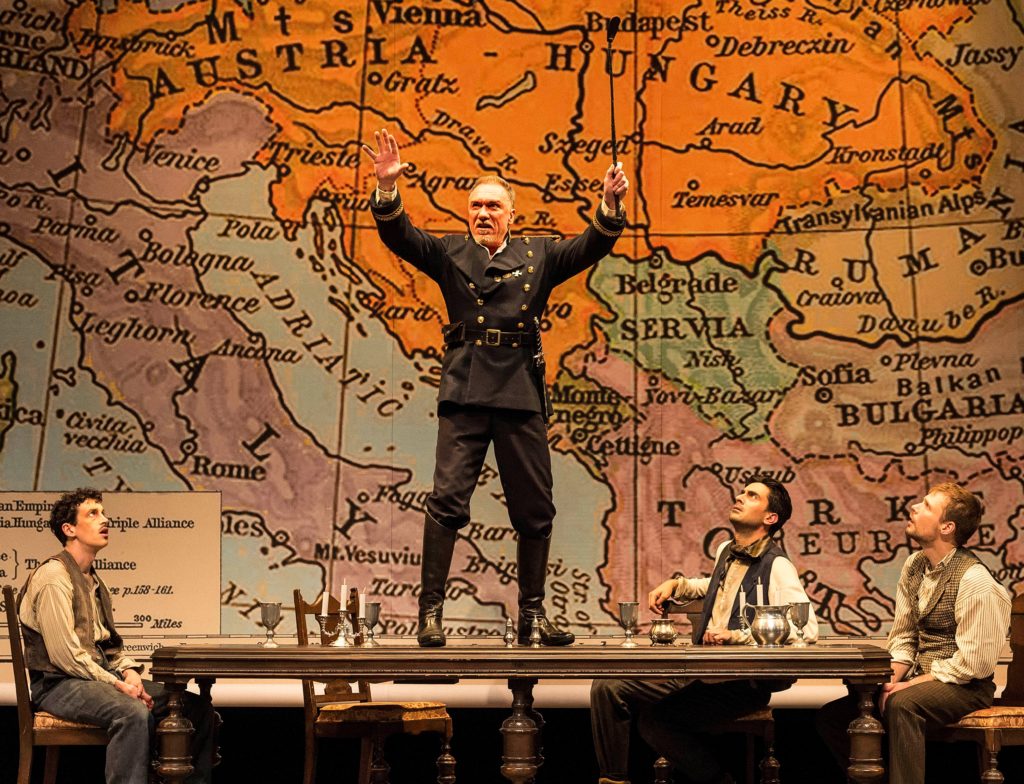
L-R: Stephen Stocking, Patrick Page, Ramiz Monsef and Josiah Bania in the world premiere of Rajiv Joseph’s Archduke. Directed by Giovanna Sardelli. Photo: Craig Schwartz
Apis is given the lion’s share of exposition to contend with in speeches that are interrupted time and again by his fictional housemaid Sladjana [Joanne McGee]. The only living female in the play, this character ends up being the weakest link overall. She may be the only person who is not afraid of standing up to Apis, but we do not understand what that means and her one scene with Gavrilo leaves us wondering how a more specific take on her character and her purpose in the story might have revealed more about the world and the stakes. She’s played for ‘nagging’ comedic effect while the three young men fall to slapstick fisticuffs that leave Gavrilo with a broken arm. In both scenes where he appears, Dr. Leko [Todd Weeks] presents our only taste of real world consequences when he diagnoses Gavrilo with TB and urges him to get treatment for his arm despite Apis’ threats, which are difficult to take seriously at that point.
When the young men board the train, a sleeper car appears and it initially takes one’s breath away. In their seven-plus hour train ride to fulfil their duty for Apis [their ‘captain’], it’s difficult not to notice this beautiful set is hardly made use of at all. The three young men discuss their plans once victorious, and it is through that dialogue that they subtly slip into future tense as Nedeljko and Trifko reveal their fate. Gavrilo slips into the future as he steps off the train. Apis and Sladjana – now dressed as Ferdinand and Sophie – take positions in two chairs downstage in a moment that mirrors an earlier scene where Apis illustrated his plans. Now endowed with a knowledge and wisdom that he could never have had in the moment, Gavrilo speaks about the thousands, the millions that will die in this act he takes to save his country – and he kills the two.
Those last five minutes are the strongest when the comedic tone has dissipated and reality hit home. These young men were fighting for a freedom they believed would come if they could only rid themselves of one man in a symbolic gesture. In a post-show talkback, it was startling to hear Mr. Page refer to his character as a terrorist. There’s no argument against his assessment. It just didn’t seem to fit what we saw. One can applaud the effort to bring history to life in a new way for it seems like the perfect play for our time and yet the timelier thematic threads that touch on terrorism and misplaced patriotism got lost along the way. In the end, it missed the mark when it focused on the laugh rather than incorporating it into our present day human experience.
This post was written by the author in their personal capacity.The opinions expressed in this article are the author’s own and do not reflect the view of The Theatre Times, their staff or collaborators.
This post was written by Christine Deitner.
The views expressed here belong to the author and do not necessarily reflect our views and opinions.

